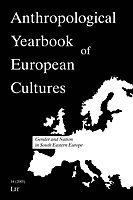Gender Relations in post-war Social Life: the Example of multi-national Herzegovina
Gender Relations in post-war Social Life: the Example of multi-national Herzegovina
Author(s): Hannes GranditsSubject(s): Anthropology
Published by: LIT Verlag
Keywords: gender relations; nationalism; ethnic relations; Bosnia-Herzegovina; post-1991-95 war; everyday life;
Summary/Abstract: During the war of the 1990s in Bosnia-Herzegovina, neo-patriarchal role ex-pectations regained enormous influence in determining moral modes of social interaction. As a consequence of the glorification of a mythological “national” past, this also holds true for the time after the war, which is the focus of this article. But this is only one side of the coin. While a “return” to the “original” traditions of the past might have been a goal to which national ideologists as-pired, the realities of everyday life, increasingly affected by global economic and cultural processes, are too complex for such a “return” to be realised. Based on empirical research conducted in the Herzegovina region in a Croat, a Bosniac/Muslim and a Serb community respectively, this paper analyses how gender relations have evolved against the background of these antagonistic trends.
Journal: Anthropological Journal on European Cultures AJEC
- Issue Year: 2005
- Issue No: 14
- Page Range: 113-142
- Page Count: 30
- Language: English
- Content File-PDF

